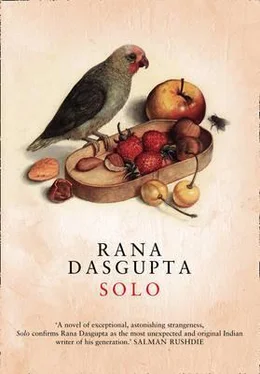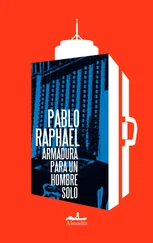Ulrich developed a routine. Every month, he delivered his salary to her, placing a pile of notes on the dresser, weighed down with a lead battleship that survived from his childhood. On Saturday mornings he set off with a shopping bag to the Ladies’ Market, where he bought groceries for the week. Afterwards, he went to the library, where he read for a few hours. He purchased a gramophone player that he listened to some evenings, with the volume down. After dinner on Sundays, he polished his shoes.
Ulrich had good features and bright, even teeth, and he could look distinguished in the glasses he now used for reading. But since the failure of his marriage he had lost his desire for communication, and even his old acquaintances seemed uneasy around him. He sat in his father’s armchair, and made his displeasure felt when his mother invited guests to the house. On weekdays, he arrived home late in the evening and sat down to read at the kitchen table, and though Elizaveta offered a nightly monologue of thoughts and anecdotes, it did nothing to draw him out.
She exploded, sometimes, with the emptiness.
‘I am full of thoughts, you know, full of feelings. Do you realise how lonely I am, living like this?’
She found things to occupy her. She stripped everything out of the house, and had the walls repainted. She organised old photographs, and resumed her dressmaking. She read every newspaper with close attention, and she began to write a series of memoirs about the travels she had made with her husband before the wars.
She bought a dog to keep her company. She called it Karim, and she took it for walks in the evenings, which gave her some release.
In the hour before they retired, the silence claimed his mother too, and Ulrich relaxed into contentment. While the ball of wool twitched with her knitting, his attention drifted from his books and spiralled into his own recesses, where old faces coasted past like comforting submarine monsters, and fine filaments lit up a route to the future. He came to find comfort in these daydreams, and on the days when he did not have an opportunity to cultivate them, he went to bed quite unsatisfied.
After the fascist coup of 1934, democratic freedoms were cancelled, political parties abolished, and espionage and surveillance reigned in every sector of society. Elizaveta became the centre of a group of men and women who met regularly to discuss political affairs. The values of democracy, commerce and freedom that she stood for were being squeezed between the Bolsheviks and the fascists, who were both sweeping the country with their murderous recruitment drives. She clung to the hope that earnest discussions between learned, reasonable people would somehow help to restore sanity and moderation.
Every Thursday, priests, lawyers, doctors and professors came to her house to debate the burden of war reparations and the rise of Macedonian terrorism, the oppression of Bulgarians in Yugoslavia, and the problem of the refugees. They discussed the awakening in the East, and the rise of China. They argued about Spain and Abyssinia.
At one meeting Elizaveta gave an edifying lecture about the prospects of the new nation of Iraq, a land for which she still entertained an extravagant affection.
Above all, they discussed German politics, and the increasing hold of that country over their own. German industrialists now filled the hotels of Sofia, planning new mining ventures and chemical plants, and taking over the Bulgarian tobacco industry. When the king allied himself with Chancellor Hitler, and German industry began to supply the Bulgarian army with gleaming modern armaments, Elizaveta and her associates wrote a plea for political prudence that they circulated to the newspapers and to several thinking people in the city. It began thus:
WHILST IT IS TRUE that, since the independence of our nation, we have, by war and enforced treaty, lost great expanses of our territory to neighbouring countries, AND thousands of our fellow countrymen live under the daily oppression of foreign governments, AND our politics have descended frequently into violence and chaos which have resulted in terrible deprivations for our people, NEVERTHELESS, the decades have revealed that the Great Powers are not swayed by these sufferings, and every alliance with them has rebounded even more disastrously upon us. WE OPPOSE the alliance with Germany, whose might will never be employed to right the wrongs of our Bulgarian history, and whose use of us in the past has been responsible for many of our present ills.
When Germany invaded Poland, and the Great Powers went to war, the king tried valiantly to keep Bulgaria out of the conflict, but there was no way to hold off the inevitable. The Wehrmacht pushed through into the Balkans and overran the country, taking command of its army and industry — and humble Bulgaria found itself at war, against its will, with America, Britain and the Soviet Union.
Ulrich was sent to man an observation tower, scanning the night skies with binoculars for British and American bombers, but the bombardment, when it arrived, was mighty and irresistible. He remembers looking up into the night at the lines of planes, their bellies lit up theatrically with the explosions, the deep noise out of phase with the flashes because of the distance. He wondered how the city would look from so high, and thought it must seem unreal, like a toy, and incapable of pain.
One night, sheltering in the basement with his mother, though he had a blanket pressed to his ears to protect his hearing, he heard a terrible screeching outside, inhuman and uncouth, as if a savage and relentless giant were sawing steel. It went on and on, undaunted by the explosions, tearing at Ulrich’s nerves, and all at once he went out to see what it was.
A house was hit near by, and flames sprang from the upper-storey windows, lighting up the street. In the gaps in the smoke he could see the domes of the Alexander Nevski church glinting in the flashes, and the red air shook with an overwhelming roar. Others were running to discover what the noise was. Someone brought a lantern, and soon they came upon a horse pinned down in the rubble, its raw flesh glistening in the lamplight, screaming as if it would wake the dead. In this pitch of war they could find no gun, and they had to dispatch it with an axe.
In the mornings, Ulrich wandered through the stench of quenched fire watching people digging corpses out from the rubble, and he saw women writing the names of missing people on trees. He looked up through Doric windows that now housed nothing, and were only frames for the implacable sky.
With the military leadership absorbed by the war, the long-suppressed partisan communists, in concert with Moscow, saw their chance for a full-blown uprising, and the government’s punishments saw whole villages destroyed. The country was ripped apart. Elizaveta honoured every side with obscenities that Ulrich had never before heard from her mouth.
‘Bulgarian soldiers are cutting off the breasts of our young women,’ she wailed. ‘They are throwing young Bulgarian men into ovens! And who is benefiting? Only our enemies, who will come in afterwards and build cities over our dead.’
She was consumed by the horror of what was happening, and she became grim and dogged. When Hitler ordered the king to round up the Bulgarian Jews and send them to the labour camps, Elizaveta became an organiser for the protests. Her house became a war office for the outraged teachers and lawyers who marched during the day and debated through the night. When the king finally announced he would not give up Bulgaria’s Jews, Elizaveta was exultant, for it seemed it was possible for decent people to make themselves heard. But after the war, all the Jews who had been saved departed for Israel and America, and the society she had fought to preserve was anyway broken up.
Читать дальше
Конец ознакомительного отрывка
Купить книгу












